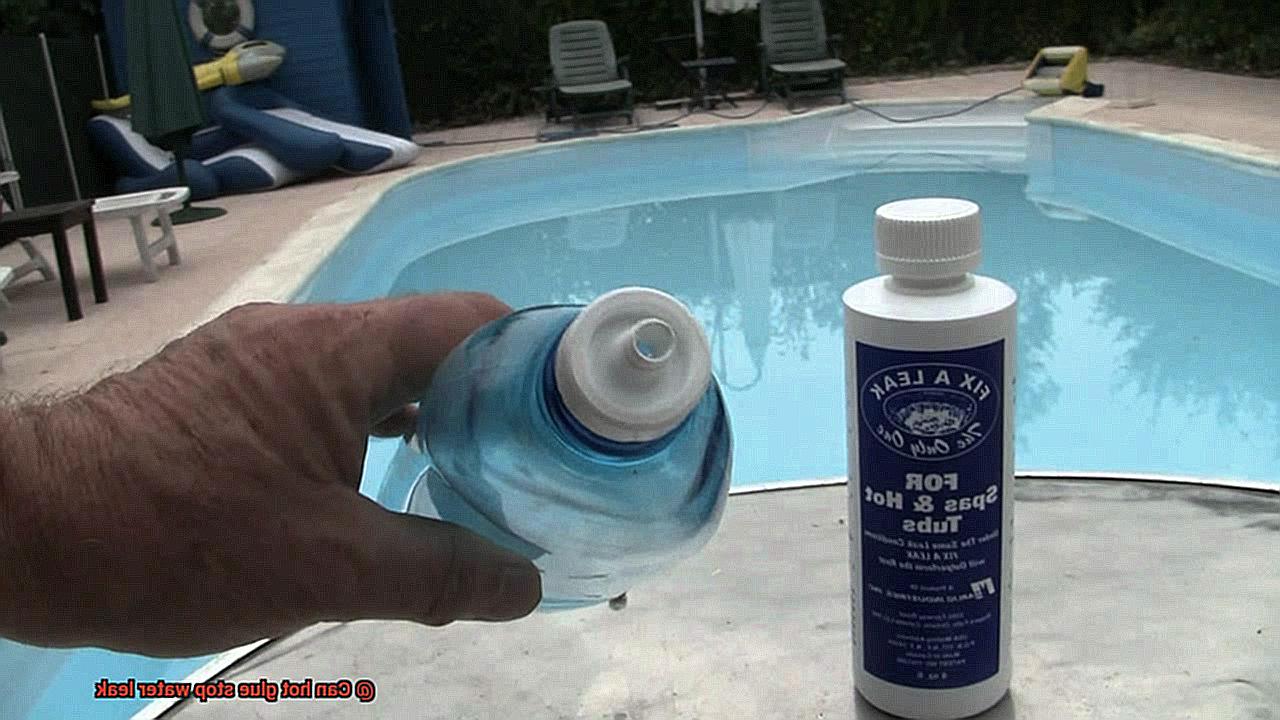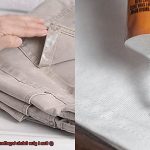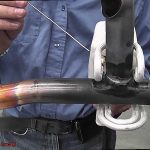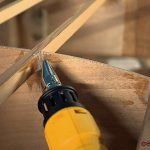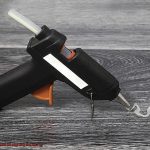Are you tired of dealing with pesky water leaks that drain your wallet and patience? The thought of calling a professional plumber may seem daunting, but what if there was a DIY solution that could save you time and money? Enter hot glue – the versatile adhesive that has become a staple in many DIY projects. But can it really put an end to those frustrating water leaks?
This question has sparked debate among plumbing experts and DIY enthusiasts alike. While some swear by hot glue as a temporary fix, others argue that it’s not reliable enough to tackle serious leaks. So, what’s the verdict?
In this blog post, we’ll delve into the science behind hot glue and how it interacts with water. We’ll also explore the pros and cons of using hot glue as a DIY solution for water leaks, as well as alternative options for those seeking a more permanent fix.
By the end of this post, you’ll have all the information you need to decide whether or not hot glue is worth considering for your next home repair project. So grab your safety goggles and let’s dive in – it’s time to settle the debate once and for all.
What is Hot Glue?
Contents
Hot glue, also known as hot melt adhesive, is an incredibly versatile adhesive that can be used for a wide range of applications. This type of adhesive is applied in a molten state and solidifies quickly as it cools down, making it perfect for fast repairs or DIY projects.
Hot glue is typically made from thermoplastic materials such as EVA or polyamide. These materials are melted down in a hot glue gun and applied to the surface that needs to be bonded. As the glue cools, it creates a strong and durable bond between the two surfaces.
One of the biggest advantages of hot glue is its versatility. It can be used on almost any surface, including paper, fabric, plastic, metal, and wood. Its ability to bond dissimilar materials together makes it a popular choice for crafting and woodworking projects.
However, one question that often arises is whether hot glue can be used to stop water leaks. While hot glue can effectively seal small gaps and cracks, it’s not recommended as a long-term solution for stopping water leaks.
Hot glue is designed to bond quickly and solidify when it cools, which makes it perfect for temporary fixes. But it’s not designed to withstand the pressure and flow of water over time. Additionally, hot glue can degrade over time due to exposure to water and other environmental factors. This can cause it to lose its adhesive properties and become brittle.
Using hot glue to stop a water leak may actually exacerbate the problem by trapping water inside the damaged area and causing further damage or corrosion. So if you have a water leak that needs fixing, it’s always best to consult with a licensed professional who can provide expert advice on the best course of action.
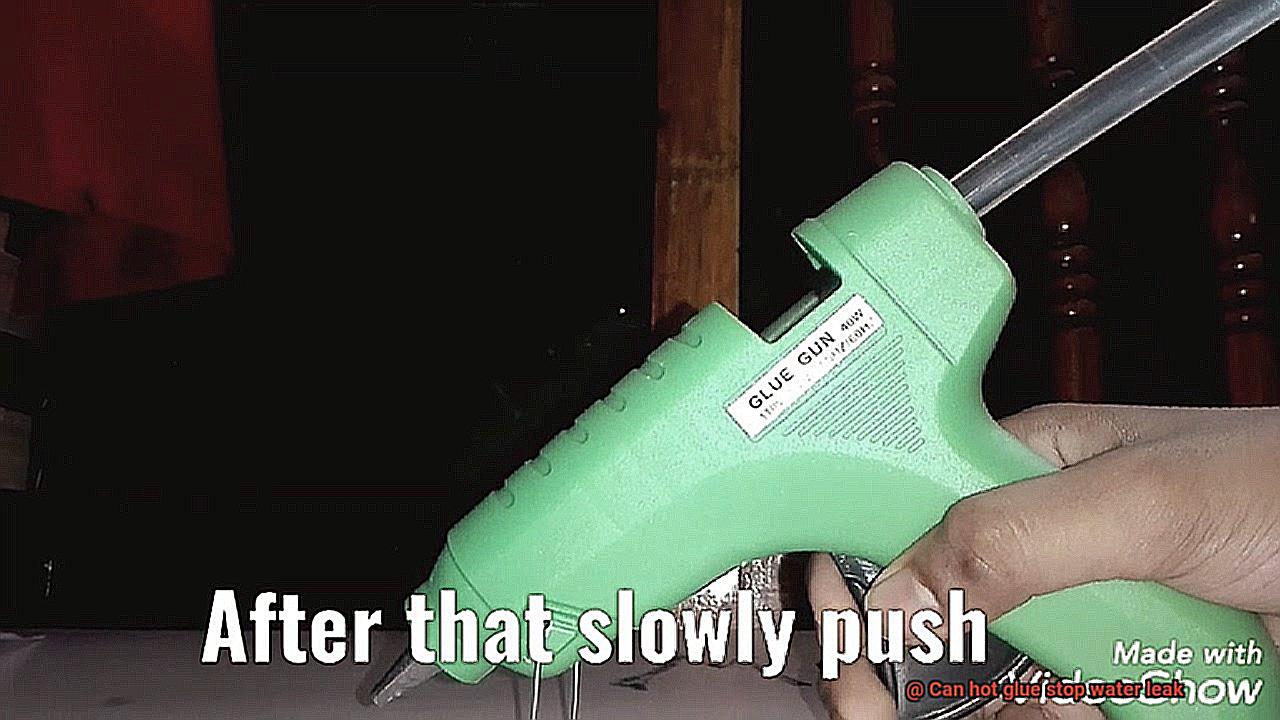
Can Hot Glue be Used to Stop a Water Leak?
While hot glue can be effective in sealing small leaks and cracks, it may not be the best solution for larger leaks or those occurring in high-pressure areas.
Made from thermoplastic materials, hot glue melts when heated and solidifies as it cools. This property makes it an excellent choice for sealing small leaks and gaps. However, it’s important to keep in mind that hot glue may not be waterproof and may degrade over time when exposed to water. This means that it might not be a permanent solution for stopping water leaks.
Before using hot glue to stop a water leak, it’s crucial to understand the type of leak you’re dealing with. If the leak is minor and in an area where there is low water pressure, then hot glue may be an effective solution. But if the leak is significant or in an area with high water pressure, you might need to seek professional help or use a more specialized sealant.
It’s also worth noting that hot glue should never be used on pipes or plumbing fixtures that contain hot water or steam. This is because hot glue can melt and become ineffective under high temperatures, which can cause further damage and potentially dangerous situations.
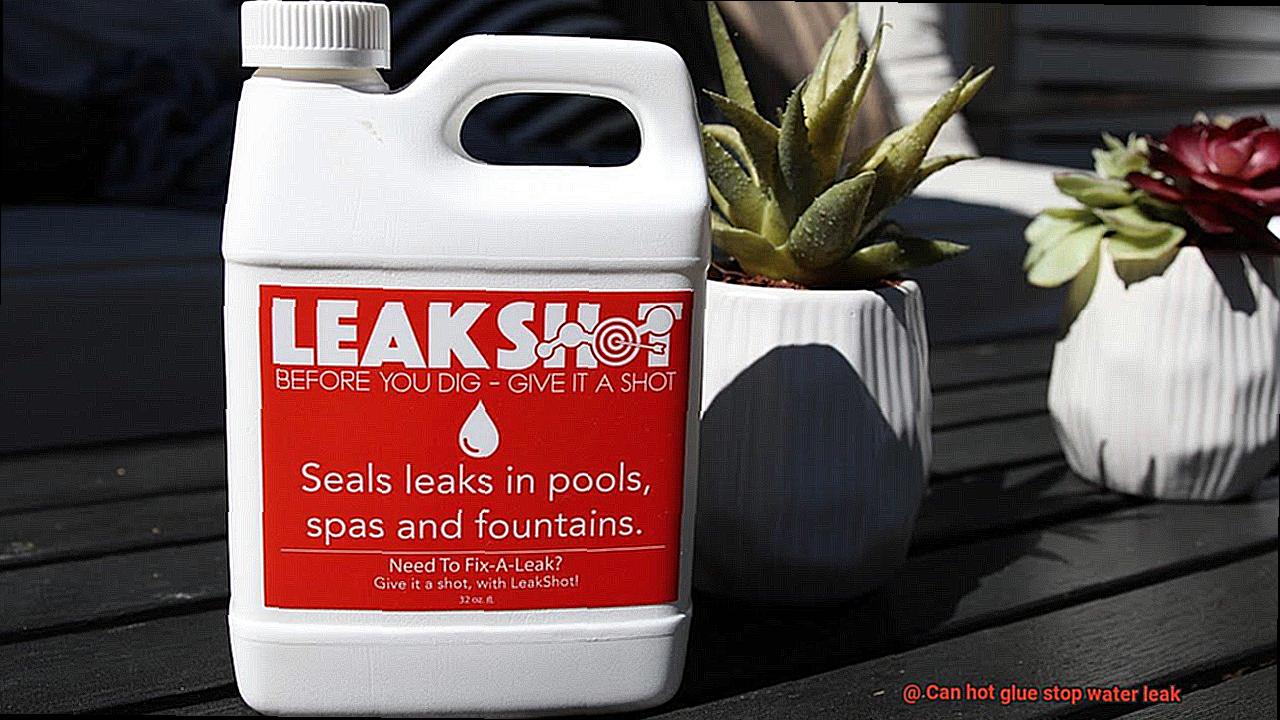
Advantages of Using Hot Glue for Temporary Fixes
Hot glue is not just for arts and crafts; it’s a versatile adhesive that can be used for various temporary fixes, including water leaks. One of the most significant advantages of using hot glue for temporary fixes is its quick-drying time, allowing you to use the repaired item almost immediately. This can be especially helpful when dealing with water leaks, where time is often of the essence in preventing further damage.
Another great benefit of hot glue is its waterproof and heat-resistant properties. It can seal leaks in pipes or other water-related fixtures without fear of it breaking down or losing its effectiveness over time. Its ability to bond to a wide range of surfaces, including plastic and metal, makes it an ideal solution for various types of leaks.
Hot glue is also affordable compared to other types of adhesives. Hot glue guns and sticks are readily available at most hardware stores, making it accessible to anyone who needs a quick fix for their water leak.
But that’s not all. Hot glue is incredibly easy to apply and does not require any special tools or training. Anyone can use it to fix a water leak, regardless of their DIY skills.
However, it’s important to note that hot glue should not be relied upon as a permanent solution for water leaks. While it may provide a temporary fix, it is not designed to withstand the high pressure or constant exposure to water that may occur in some situations.
Disadvantages of Using Hot Glue for Long-Term Solutions
Hot glue is an incredibly useful tool for quick fixes, but it’s not the answer for long-term solutions. If you’re dealing with water leaks, there are several reasons why hot glue may not be the best solution.
One major disadvantage of using hot glue for long-term solutions is its inability to withstand constant exposure to water or moisture. Over time, hot glue can break down and lose its adhesive properties, leading to a failed repair. This means that if you’re looking for a permanent solution for a water leak, hot glue isn’t your best bet.
Another issue is that hot glue may not bond well with certain materials. If you’re dealing with surfaces that are oily or greasy, hot glue may not create a strong and lasting bond, leading to another failed repair. It’s important to recognize this limitation before making any repairs.
Additionally, hot glue is not a flexible adhesive. If you apply it to a surface that expands or contracts due to changes in temperature or moisture, the glue can become brittle and crack, leading to yet another failed repair. So, if you’re dealing with an issue that requires flexibility, such as sealing gaps between two surfaces that move independently of each other, hot glue may not be suitable.
Finally, hot glue may not be strong enough to withstand high pressure or heavy loads. If you use it to repair a leak in a pipe or other plumbing fixture, the hot glue may not hold up under the pressure of flowing water, leading to another leak or even a burst pipe.
Alternatives to Hot Glue for Water Leaks
While hot glue can be a quick fix, it may not always provide a long-lasting solution. Luckily, there are several alternatives that can help stop water leaks once and for all.
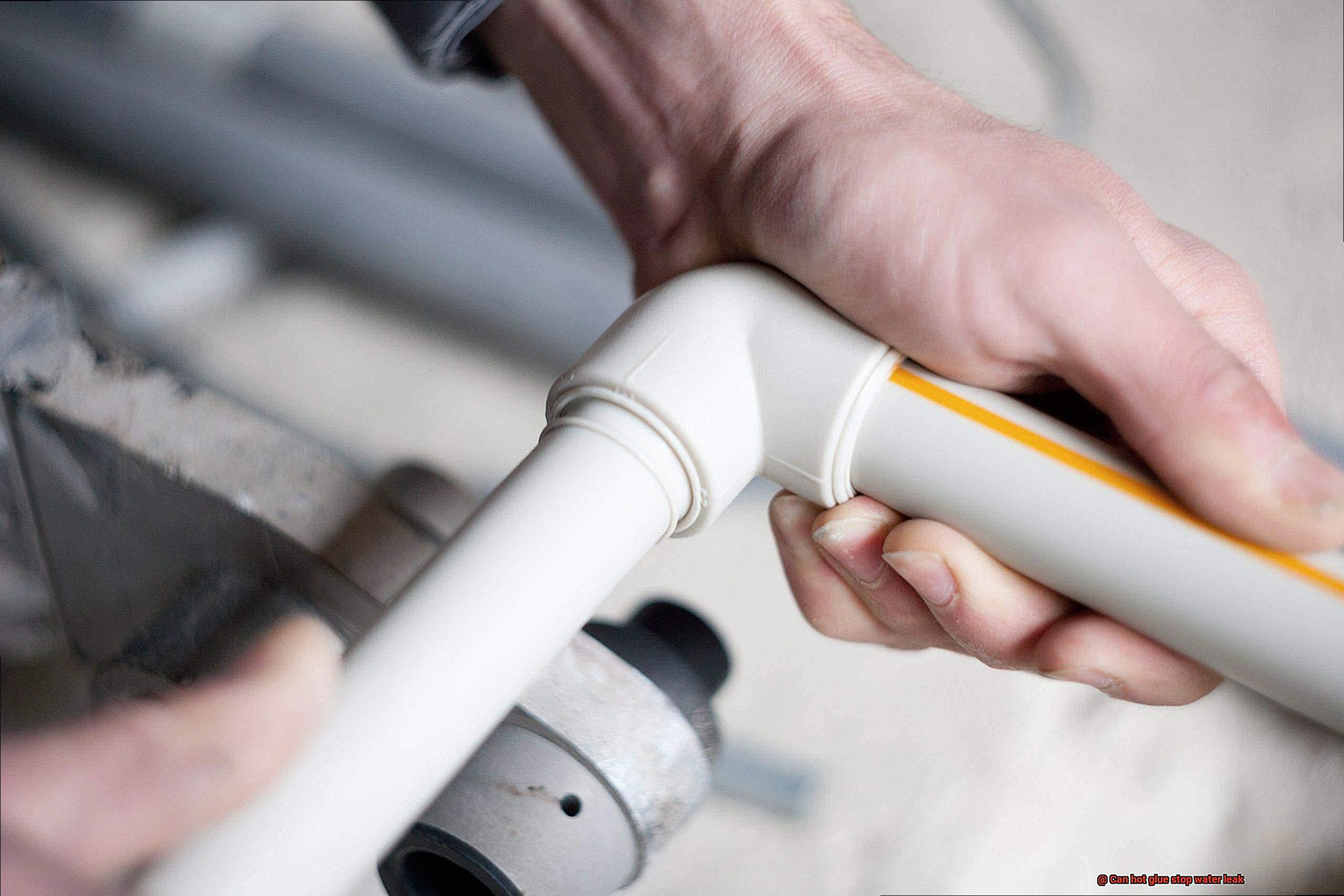
First on the list is epoxy – a two-part adhesive that creates a strong, permanent bond when mixed together. It’s perfect for plumbing repairs and can even fill in cracks or holes in pipes. Its versatility makes it ideal for a variety of surfaces.
Another option is silicone sealant, a flexible and waterproof adhesive that can be used on glass, metal, and plastic surfaces. It’s also able to withstand high temperatures and pressure, making it perfect for plumbing repairs.
Teflon tape is yet another alternative to hot glue. This thin, white tape can be wrapped around pipe threads before connecting them to create a tight seal that prevents leaks from occurring. This option is especially useful for small leaks that occur in hard-to-reach areas.
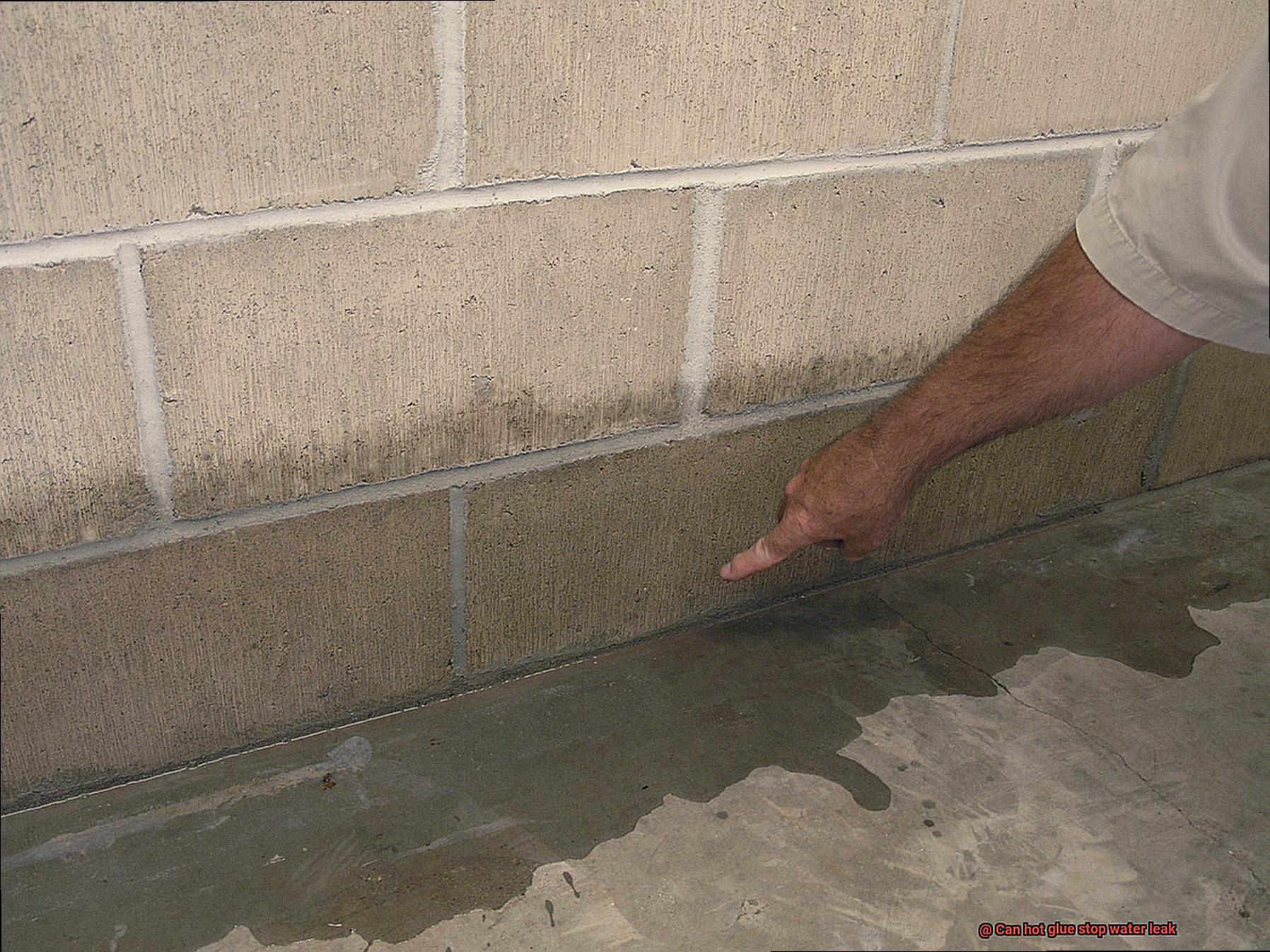
Lastly, pipe repair clamps are an easy-to-use and effective solution for emergency situations. They wrap around the damaged area of a pipe and tighten down to create a seal.
Also Read: Best Glue for Kayaks
Conclusion
To wrap it up, hot glue is a fantastic adhesive for all sorts of creative projects, but when it comes to water leaks, it may not be the most effective solution. Although it can seal small gaps and cracks temporarily, it’s not designed to handle the pressure and flow of water over an extended period. Moreover, hot glue can deteriorate with time due to exposure to moisture and other environmental factors, which could lead to further damage or corrosion.
However, there are some benefits to using hot glue for temporary fixes. It dries quickly and has waterproof and heat-resistant properties that make it ideal for various leak types. Additionally, hot glue is affordable, simple to apply, and doesn’t require any specialized tools or training.
If you’re looking for a more permanent solution for your water leaks, several alternatives such as epoxy, silicone sealant, Teflon tape or pipe repair clamps might be more suitable. These options are designed to endure constant exposure to water or moisture while providing a robust and long-lasting bond.
In short, if you’re dealing with frustrating water leaks that are draining your wallet and patience alike, consider consulting with an experienced professional who can offer expert advice on the best course of action.

